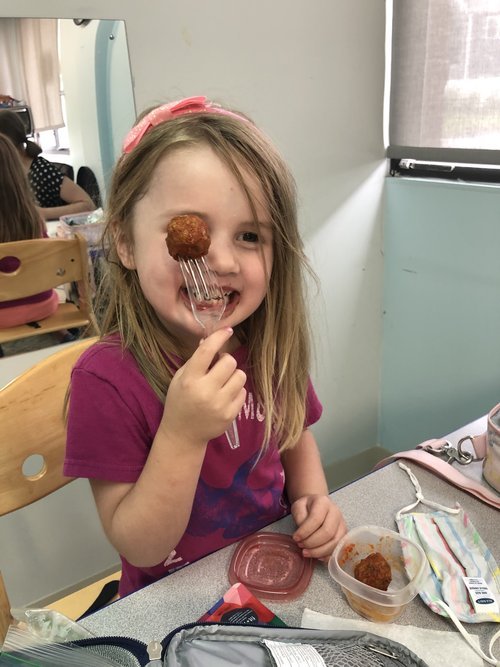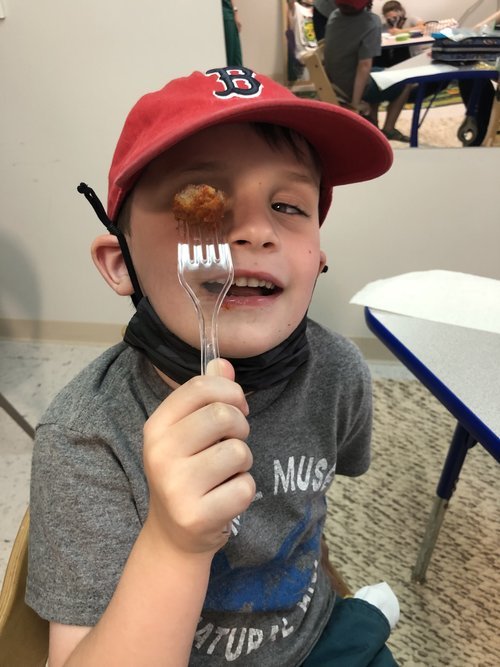Pediatric Feeding Therapy
One of the largest pediatric feeding therapy teams on the North Shore specializing in both individual and group feeding therapy for children.
How Feeding Therapy Improves Mealtimes
By using a fun play-based approach that encourages kids to stay motivated and participate in sessions, our feeding team addresses sensory-based and oral motor challenges that may impact a child’s eating success.
Feeding Therapy at Buttonloop
We offer both individual and group feeding sessions. Sessions are tailored to each individual’s needs, and recommendations for group or individual treatment will be made by your feeding specialist at the time of the evaluation.
What to Expect during a Pediatric Feeding Therapy Session
-

Your Picky Eater's First Appointment.
You will bring in 3 preferred foods and 3 non-preferred foods. The feeding expert will gather information regarding each individual's goals, and feeding challenges, from the caregiver. The feeding specialist will observe your child's oral motor skills (e.g., how they chew and manage foods) to identify any weaknesses this may be causing on overall food consumption. They will also observe your child's interactions with non-preferred foods to identify which areas of sensory areas (visual, smell, taste, touch) are their strengths and weaknesses.
-

Follow-Up Sessions: Family Group Feeding Therapy
The clinician will help the parent develop a food hierarchy (types of foods to try). The family will prepare and bring in the foods to try during the sessions. Each food hierarchy is tailored to the individual's food preferences and aversions. During the session, the feeding specialist will work up the sensory hierarchy in a fun and play-based approach to encourage the child to take small "steps" to interact with non-preferred foods. A large portion of feeding therapy is also spent around caregiver education and help training families to carry-over skills within the home.
Feeding therapy may be beneficial if your child demonstrates any of the following:
Your child eats less than 20 foods
Weight gain is a struggle
If most mealtimes are a struggle
You need to make your child a separate meal from the rest of your family frequently
You report difficulty with eating/meals at at least 2 well-child check-ups
Child suffers from sensory integration disorders
Tactile sensitivity
Your child refuses to touch foods, often wipes hands, demonstrates finger splay, and doesn't notice when dirty.
Olfactory sensitivity
Your child is easily bothered by smells.
Visual sensitivity
Looks away from non-preferred foods, is bothered by non-preferred foods on their plate or in their personal space, visually dependent on the presentation of foods (e.g., sandwich needs to be cut into triangles every time, notices small changes such as small black specks of pepper, etc.), resistant to try new brands of food based on packaging
Feeding Therapy Testimonial
“My 2 year old was flagged during his doctors appointment as “failure to thrive.” He was not gaining weight during his checkups and refusing to eat meals instead would eat lots of snacks and milk. We met with a nutritionist who suggested some short term fixes but I wanted a long term plan. For four months I worked weekly with both Lauren and Katie and they were incredible. They diagnosed my son's issues with swallowing and food avoidance and week to week we made a customized plan together to get him to try new foods and learn to chew effectively. He is now gaining weight, participating in shared family meals and my anxiety around his eating is gone! I have a whole new respect for Food Therapy. The systematic approach works and I am very grateful!”
— Father of a 2 year old Buttonloop child






There are a 3 ways to get started with Buttonloop Children’s Therapies.
No matter where you are on your journey, we can help.
If you are ready to get started and book an appointment, please choose:
Option 1
Complete our intake form, and we can move forward with scheduling your initial appointment.
If you are wondering if therapy could be helpful and would like to speak with a clinician, please choose:
Option 2
Book a free 10-minute phone consultation with a clinician.
If you’d like someone from our team to reach out to you directly, please choose:
Option 3
Fill out the contact form, and we will contact you by phone or email.


